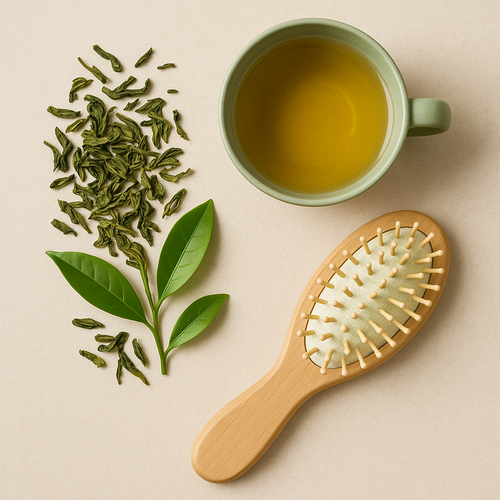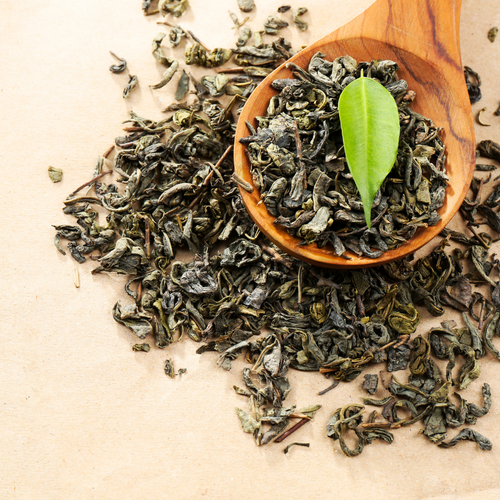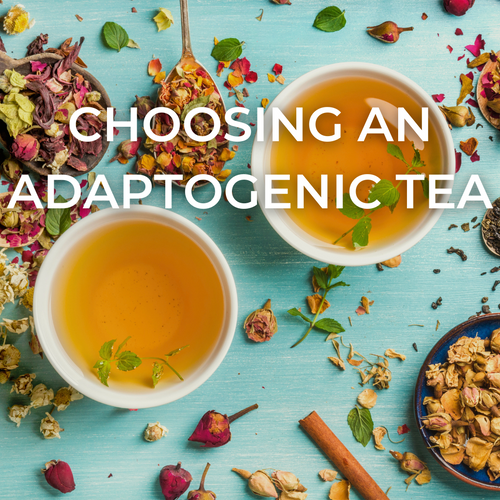Adaptogens are fascinating natural substances that have sparked interest among those concerned about wellness and holistic health. If you've been wondering "what are adaptogens" and whether they can benefit your health, this comprehensive guide we’ll discuss scientifically backed information to help you understand their potential impacts on your health and wellbeing.
What Are Adaptogens?
Adaptogens are a unique class of herbs and fungi known for their ability to help the body resist various stressors, whether they are physical, chemical, or biological. In short, adaptogens help the body adapt to stress and maintain balance. The term "adaptogen" was first coined by Russian scientist Dr. Nikolai Lazarev in 1940, and it describes substances that correct systemic imbalances in the body and protect the immune system.
Origins and History
The use of adaptogenic herbs dates back thousands of years, with roots in traditional Chinese and Ayurvedic medicine. Herbs like ginseng, ashwagandha, and holy basil have been used for centuries to promote vitality, resilience, and longevity.

Scientific Definition
For a substance to be classified as an adaptogen, it should meet three criteria:
- It must help the body resist a wide range of stressors.
- It must help normalize bodily functions.
- It must be safe and non-toxic to the body at normal doses.
What Do Adaptogens Do?
Adaptogens work primarily by modulating the body's stress response. They interact with the hypothalamic-pituitary-adrenal (HPA) axis and the sympathetic nervous system to balance stress hormones like cortisol and adrenaline.
How Adaptogens Work
1. HPA Axis Regulation: Adaptogens help regulate the HPA axis, which controls the body's response to stress. By modulating cortisol levels, adaptogens can help reduce the harmful effects of chronic stress.
2. Cellular Energy Production: Some adaptogens enhance the production of ATP, the cellular energy currency, improving physical and mental stamina.
3. Anti-Inflammatory Effects: Adaptogens can reduce inflammation by decreasing pro-inflammatory cytokines and upregulating anti-inflammatory substances.
Possible Health Benefits
1. Reduced Stress and Anxiety: Numerous studies have shown that adaptogens like ashwagandha and Rhodiola rosea can reduce symptoms of stress and anxiety.
2. Enhanced Cognitive Function: Adaptogens such as ginseng and bacopa have been suggested to improve cognitive function, including memory and attention.
3. Improved Physical Performance: Athletes often use adaptogens like Rhodiola rosea and eleuthero to enhance endurance and reduce fatigue.
4. Immune Support: Adaptogens like reishi mushroom and astragalus may boost immune function by enhancing the activity of white blood cells.
Best Adaptogens to Take
While there are many adaptogens available, some are particularly well-researched and popular for their potential wellness boosting effects.
1. Ashwagandha (Withania somnifera)
Ashwagandha is a powerful adaptogen with a long history in Ayurvedic medicine. It is used to reduce stress, improve sleep, and enhance cognitive function. Ashwagandha contains active compounds called withanolides, which have been shown to lower cortisol levels and improve stress resilience. Studies suggest that ashwagandha can also improve endurance, muscle strength, and recovery in athletes.
2. Rhodiola Rosea
Rhodiola rosea is commonly used to combat fatigue, improve mood, and enhance physical performance. It may be particularly helpful for people dealing with high levels of stress. Rhodiola contains active compounds like rosavin and salidroside, which are believed to help balance the stress-response system. Research indicates that Rhodiola may improve symptoms of burnout, reduce mental fatigue, and enhance cognitive function under stress.
3. Holy Basil (Ocimum sanctum)
Also known as tulsi, holy basil is revered in Ayurvedic medicine for its ability to promote mental clarity, reduce stress, and support the immune system. Holy basil contains compounds such as eugenol and rosmarinic acid, which have anti-inflammatory and antioxidant properties. Studies have shown that holy basil can reduce symptoms of anxiety and depression, support immune function, and protect against oxidative stress.
4. Ginseng (Panax ginseng)
Ginseng is one of the most well-known adaptogens, often used to boost energy, enhance cognitive function, and support the immune system. Ginseng contains active compounds called ginsenosides, which have been shown to have anti-inflammatory and antioxidant effects. Research suggests that ginseng can improve mental performance, reduce fatigue, and enhance physical endurance. It is also used to support the immune system and improve overall vitality.
5. Reishi Mushroom (Ganoderma lucidum)
Reishi mushroom is celebrated for its immune-boosting properties and its ability to promote relaxation and improve sleep quality. Reishi contains polysaccharides, triterpenoids, and peptidoglycans, which contribute to its health benefits. Studies have shown that reishi can enhance immune function, reduce inflammation, and improve sleep.
6. Schisandra (Schisandra chinensis)
Schisandra is a traditional Chinese medicinal herb known for its adaptogenic properties. It is used to enhance mental clarity, reduce stress, and improve physical endurance. Schisandra contains compounds called lignans, which are believed to have antioxidant and anti-inflammatory effects. Research suggests that schisandra can improve cognitive function, protect against stress-induced damage, and enhance physical performance.
7. Eleuthero (Eleutherococcus senticosus)
Also known as Siberian ginseng, eleuthero is used to improve physical stamina, reduce fatigue, and enhance immune function. Eleuthero contains compounds called eleutherosides, which are thought to contribute to its adaptogenic effects. Studies suggest that eleuthero can improve endurance, reduce stress-induced fatigue, and support immune health. It is often used by athletes and individuals under high levels of physical or mental stress.
Side Effects
While adaptogens are generally considered safe, they can cause side effects in some individuals, particularly if taken in large doses or for extended periods.
Common Side Effects
1. Gastrointestinal Issues: Some adaptogens may cause stomach upset, nausea, or diarrhea.
2. Allergic Reactions: Though rare, allergic reactions such as rashes or itching can occur.
3. Interactions with Medications: Adaptogens can interact with certain medications and might impact how they work. If you have a medical condition, you should always discuss adaptogens with your doctor before using them.
Precautions
- Pregnancy and Breastfeeding: It's advisable for pregnant or breastfeeding women to consult with a healthcare provider before taking adaptogens.
- Preexisting Conditions: Individuals with health conditions, autoimmune diseases, or hormonal disorders should seek medical advice prior to use.
How to Use Adaptogens
Incorporating adaptogens into your daily routine can be done in various ways, depending on your preferences and health goals.
1. Oral Supplements
Adaptogens are commonly available in the form of capsules, powders, and tinctures. These supplements can be taken to help manage stress and improve overall well-being.
2. Topical Applications for Skin and Hair
Adaptogens are increasingly being used in skincare and haircare products due to their anti-inflammatory and antioxidant properties. For example:
- Ashwagandha: Used for its ability to boost skin hydration and improve skin elasticity.
- Reishi Mushroom: Used in anti-aging products for its anti-inflammatory and antioxidant properties.
- Holy Basil: May help in reducing acne and improving the overall complexion.
3. Teas with Adaptogens
Drinking adaptogenic teas is a soothing and effective way to enjoy the benefits of these powerful herbs. Popular adaptogenic teas include:
- Tulsi (Holy Basil) Tea: Known for its calming effects and ability to support the immune system.
- Ginseng Tea: Used to provide an energy boost and enhance cognitive function.
- Reishi Mushroom Tea: Promotes relaxation and improves sleep quality.

Frequently Asked Questions
What Are Adaptogens?
Adaptogens are natural substances that help the body adapt to stress and maintain balance.
How Do Adaptogens Work?
Adaptogens work by modulating the stress response, balancing cortisol levels, and enhancing cellular energy production.
What are the most popular adaptogens?
Some of the most popular and researched adaptogens include:
- Ashwagandha: Known for its ability to reduce stress and anxiety, improve cognitive function, and support overall vitality.
- Rhodiola Rosea: Recognized for its ability to enhance mental performance, reduce fatigue, and support physical endurance.
- Holy Basil (Tulsi): Celebrated for its anti-inflammatory properties, stress reduction, and support of immune function.
- Eleuthero (Siberian Ginseng): Used to increase endurance, reduce fatigue, and support overall well-being.
Can Adaptogens Cause Side Effects?
While generally thought to be safe, adaptogens can cause gastrointestinal issues, allergic reactions, and interact with certain medications. Side effects have been reported with adaptogens.
How Should I Take Adaptogens?
Adaptogens can be taken as oral supplements, incorporated into skincare and haircare products, or enjoyed as teas.
Are Adaptogens Safe for Everyone?
It's advisable for pregnant or breastfeeding women and individuals with medical conditions to consult with a healthcare provider before using adaptogens.
How Long Does It Take to See the Benefits of Adaptogens?
The time it takes to experience the benefits of adaptogens can vary depending on the individual and the specific adaptogen used. Generally, it may take a few weeks to a couple of months to notice significant effects. It's important to follow the recommended dosage and give your body time to adapt. Patience and consistency are key when incorporating adaptogens into your wellness routine.
Conclusion
Adaptogens offer a promising and holistic way to manage stress and enhance overall health. Whether you're looking to boost your energy, improve your cognitive function, or support your immune system, there's likely an adaptogen that can help. As always, it's important to choose high-quality products and consult with a healthcare provider to ensure they're right for you.
References:
1. Zubair AR, Soo, HY et al. Adaptogenic effects of Panax ginseng on modulation of immune functions.
2. Lian-ying L, Yi-fan H et al. A preliminary review of studies on adaptogens: comparison of their bioactivity in TCM with that of ginseng-like herbs used worldwide.
3. https://my.clevelandclinic.org/health/drugs/22361-adaptogens
4. Panossian A and Wikman G. Effects of Adaptogens on the Central Nervous System and the Molecular Mechanisms Associated with Their Stress—Protective Activity





















